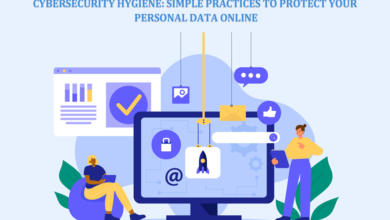Cybersecurity Laws Every American Needs to Know
Cybersecurity laws every American should know. Learn key regulations protecting your data, privacy, and online security in the US. Stay compliant.

Cybersecurity laws are the backbone of digital protection in the United States, safeguarding individuals, businesses, and government entities from an ever-growing wave of cyber threats. As technology advances, so do the tactics of cybercriminals, making legal frameworks essential for maintaining privacy, financial security, and national safety. This comprehensive guide explores the most critical cybersecurity laws affecting Americans, detailing their provisions, enforcement mechanisms, and real-world implications. These variations mean businesses operating across multiple states must tailor their compliance strategies accordingly.
In an era where data breaches, identity theft, and ransomware attacks dominate headlines, understanding cybersecurity laws is no longer optional it’s a necessity. The U.S. has implemented a mix of federal and state regulations designed to protect sensitive information, hold organizations accountable, and empower individuals with legal rights over their data. These Cybersecurity Laws cover industries ranging from healthcare and finance to retail and education, ensuring that personal and corporate data remain secure in an increasingly.
Cybersecurity Laws Every American Needs to Know
The Computer Fraud and Abuse Act (CFAA)
The Computer Fraud and Abuse Act (CFAA), enacted in 1986, remains one of the most pivotal pieces of Cybersecurity Laws legislation in the U.S. Originally designed to combat hacking, the law has been amended multiple times to address evolving threats such as ransomware, phishing, and unauthorized data access. The CFAA criminalizes accessing a computer system without authorization or exceeding permitted access, with penalties ranging from fines to imprisonment.
The Health Insurance Portability and Accountability Act (HIPAA)
Healthcare is one of the most targeted sectors for cyberattacks, making the Health Insurance Portability and Accountability Act (HIPAA) a cornerstone of patient data protection. Enacted in 1996, HIPAA establishes national standards for securing electronic health records (EHRs) and mandates strict confidentiality measures. Covered entities including hospitals, insurers, and healthcare providers must implement safeguards such as encryption, access controls, and regular security audits.
The Gramm-Leach-Bliley Act (GLBA)
Financial institutions handle vast amounts of sensitive data, making them prime targets for cybercriminals. The Gramm-Leach-Bliley Act (GLBA), passed in 1999, addresses this vulnerability by imposing data protection requirements on banks, credit unions, and other financial service providers. The GLBA’s Safeguards Rule mandates that companies develop comprehensive security programs to protect customer information, including risk assessments and employee training.
The California Consumer Privacy Act (CCPA)
As one of the most progressive state-level privacy Cybersecurity Laws, the California Consumer Privacy Act (CCPA) grants residents unprecedented control over their personal data. Effective since 2020, the CCPA allows consumers to request access to their data, demand deletion, and opt out of its sale. Businesses operating in California even those based elsewhere must comply if they meet certain revenue or data-processing thresholds.
Another key component
Another key component, the Privacy Rule, requires institutions to disclose their data-sharing practices and offer opt-out options to consumers. The Federal Trade Commission (FTC) and other regulatory bodies enforce GLBA compliance, with penalties for negligence ranging from fines to legal action. Additionally, HIPAA requires breach notifications to affected individuals and the Department of Health and Human Services (HHS) within 60 days of discovery.
The General Data Protection Regulation (GDPR) and Its U.S. Impact
Although the General Data Protection Regulation (GDPR) is a European Union law, its extraterritorial scope affects many U.S. businesses. Any company processing EU residents’ data must comply with GDPR’s stringent requirements, including obtaining explicit consent for data collection, enabling the “right to be forgotten,” and reporting breaches within 72 hours. Non-compliance can lead to fines of up to €20 million or 4% of global revenue whichever is higher.
The Cybersecurity Information Sharing Act (CISA)
Cyber threats often transcend borders, necessitating collaboration between the public and private sectors. The Cybersecurity Laws Information Sharing Act (CISA), passed in 2015, facilitates this by encouraging companies to share cyber threat indicators with federal agencies. In exchange, businesses receive liability protections, ensuring they won’t face legal repercussions for disclosing security incidents. While CISA aims to bolster national cybersecurity defenses, privacy advocates have raised concerns about potential government overreach.
State-Specific Data Breach Notification Cybersecurity Laws
While federal Cybersecurity Laws provide a broad framework, state-level regulations often fill gaps in data protection. All 50 states have enacted data breach notification laws, each with unique requirements for timing, consumer alerts, and penalties. For example, New York’s SHIELD Act mandates that businesses implement “reasonable” Cybersecurity Laws measures and notify affected individuals within a “reasonable” timeframe. Meanwhile, Massachusetts’ regulations require encrypted personal data and detailed breach reporting.
Legal Recourse available in Case
For the average American, these regulations dictate how companies collect, store, and share personal information, as well as the legal recourse available in case of a breach. Despite these debates, the law remains a key tool in combating large-scale cyberattacks. Multinational corporations, tech giants, and even small businesses with EU customers must navigate GDPR alongside U.S. regulations, making it a critical consideration for global operations.
CCPA has inspired similar legislation
The CCPA has inspired similar legislation in other states, signaling a nationwide shift toward stronger privacy protections. Whether through stronger encryption, proactive breach response plans, or consumer education. The law also introduces strict breach notification requirements and enables consumers to sue companies for violations. Violations can result in fines up to $1.5 million per year, emphasizing the law’s role in enforcing accountability and the handling of sensitive consumer data.
Read More: How to Prepare Before You Hire a Software Development Company
Conclusion
The digital age demands robust legal safeguards to combat cyber threats, and cybersecurity laws serve as the first line of defense for Americans. From the CFAA’s anti-hacking provisions to HIPAA’s healthcare protections and the CCPA’s privacy rights, these regulations shape how data is collected, stored, and secured. Compliance is not just a legal obligation it’s a fundamental aspect of maintaining trust in an increasingly data-driven society. High-profile cases, such as those involving corporate espionage and government data breaches.
As cyber risks evolve, so too must the Cybersecurity Laws designed to mitigate them. Staying informed about these regulations empowers individuals to protect their personal information and enables businesses to avoid costly penalties. This article provides an in-depth look at the most significant cybersecurity laws in the U.S., explaining their origins, key provisions, and how they impact daily life. By staying informed, individuals and organizations can better protect.
FAQs
What is the penalty for violating the CFAA?
Violations can result in fines and imprisonment, with sentences ranging from one year for misdemeanors to 10+ years for aggravated offenses like hacking critical infrastructure.
Does HIPAA apply to mobile health apps?
Yes, if the app handles protected health information (PHI) on behalf of a covered entity, it must comply with HIPAA’s security and privacy rules. However, critics argue that the CFAA is sometimes applied too broadly, leading to debates over its reform.
How does the CCPA differ from the GDPR?
While both enhance data privacy, the CCPA applies only to California residents and focuses on consumer opt-out rights, whereas the GDPR requires explicit consent for data processing globally.
Are small businesses exempt from cybersecurity laws?
No many laws, including GLBA and state breach notification statutes, apply to businesses of all sizes if they handle sensitive customer data.
What should I do if a company breaches my data?
Immediately change passwords, monitor accounts for fraud, and consider freezing your credit. You may also be entitled to compensation under state or federal law.











